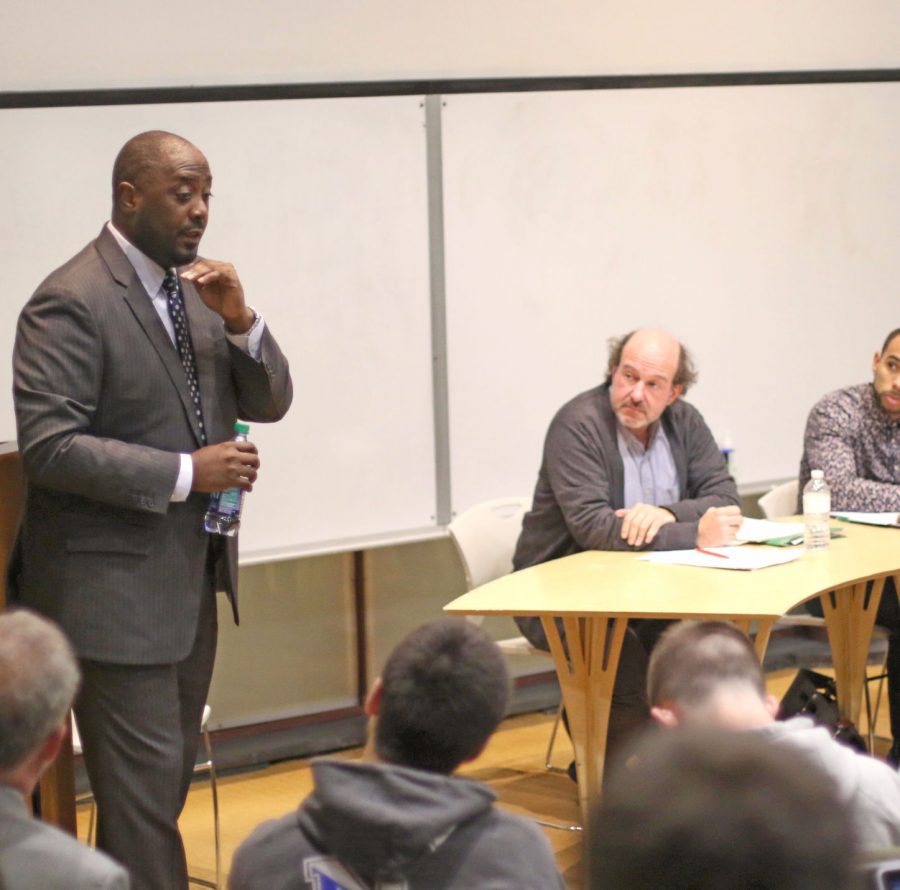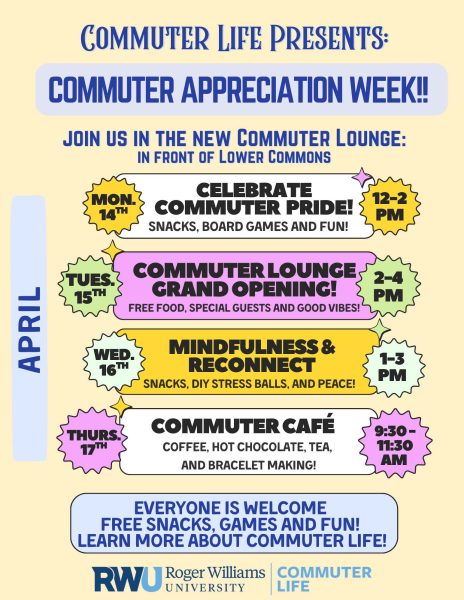Calvin White Jr., professors talk race
Between the Charlottesville protest, the NFL kneeling controversy, and Indigenous People’s Day, race relations—or, more accurately, racial tensions—in the United States have been relatively high lately.
Guest speaker Calvin White Jr., the chair of the Department of History as well as the former director of the African and African American Studies program at the University of Arkansas, joined a panel of RWU professors on Tuesday, Oct. 17 to discuss the memorialization of race.
“Without African Americans and without the contributions of African Americans, the U.S. south would not exist the way that it is romanticized or envisioned today,” White said as he opened up about his experiences as a black man living in the south.
“My job here tonight is not to change your mind about these monuments,” White continued. “If I can make you uncomfortable enough, if I can engage you, if I can make you think, then I’ve done my job.”
White pointed out that black people like Pedro Alonso Niño and York are often left out of the history that is taught to the younger generations. He also took time to speak on the Confederate soldier Robert E. Lee, whose statue gained the most controversy during the Charlottesville protest.
“As an African American male, why would I want to see a monument of Robert E. Lee in a public space of which my tax dollars helped to support?” White asked. “And when I tell you that I am bothered by it, I’m not asking you to agree with me, but I am asking you to understand why I, as an African American, cannot feel the same way about Robert E. Lee as the way that you may feel about Robert E. Lee.”
The panel also included discussion regarding the vandalism of the Christopher Columbus statue in Providence, and how that might connect to the conversation surrounding monuments linked to racism.
“What I am enjoying about this dialogue that we are having about the American south is that people are actually stepping up to the plate,” White said, adding that, in order to grow as an individual, you have to be pushed out of your comfort zone at some point.
“I’ve heard Calvin and our own African American students talk about their experiences, and it forced me to learn to listen and to become super empathetic to other people’s experiences,” said Autumn Quezada de Tavarez, associate professor of Latin American history. “My experience was not their experience, and I needed to know it, I needed to respect it… and it has deeply influenced my whole being and the way that I think about teaching and history.”
Quezada de Tavarez encouraged the audience to think about the power dynamics that control the monuments, tying it back into the theme of the year-long campus series: “Race, Gender, and Power.’
The conversation shifted to an extremely controversial topic in the U.S. at the moment: NFL players kneeling during the National Anthem. Quezada de Tavarez posed a question that many others have also considered: if those who began the kneeling identified as racially white, how might the dialogue be different from what it is now?
“We have to use our experiences to ask ourselves how to illuminate the world. This is part of the task that we have at hand in our conversations, in our projects, in our classrooms,” said Julian Bonder, professor of architecture. He continued on to explain the importance of not only witnessing injustices, but also responding to them in accordance with our responsibilities as human beings.
Aaron Allen, an assistant professor of American studies, spoke on the two types of white anxiety: that of white nationalists who are fearful regarding the changing state, and that of the opportune white activists looking for opportunities to respond to white supremacy. People feel concerned about the invisibility of white supremacy.
The audience was invited to reflect on the present state of slavery and human trafficking.
“How do we allow the past to disrupt our present?” Bonder asked.
“I really liked that ‘past disrupting our present’ quote,” said sophomore Olivia Reynolds. “I think that all of the panelists had really important points to make and I enjoyed the conversation.”
“I thought that the discussion flowed well and, although we covered lots of different topics within race, they were all still relevant and I still learned from them,” said freshman Alex Lekowski.





